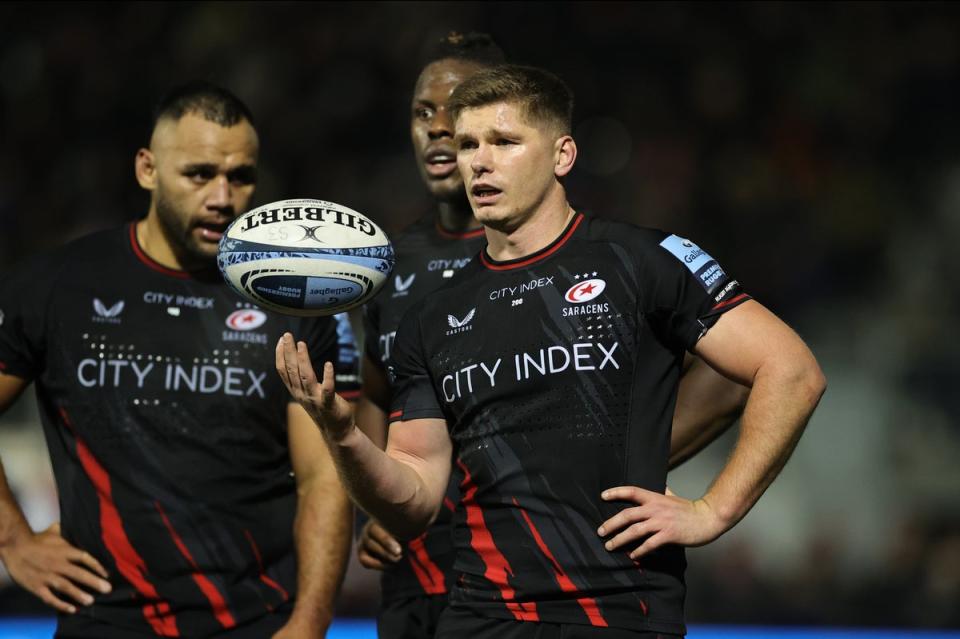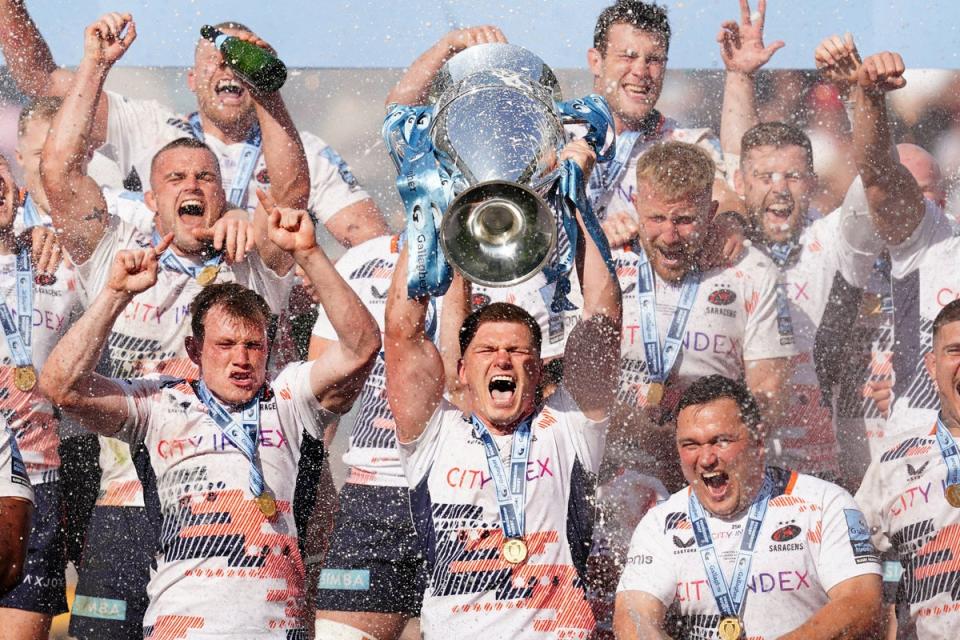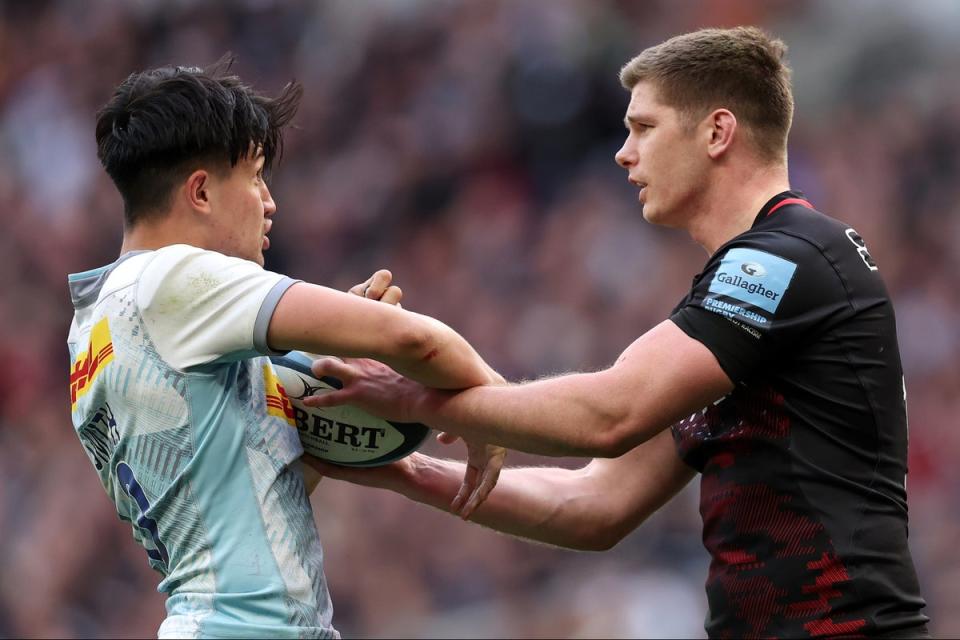Owen Farrell and Saracens begin last dance as Premiership bursts back into life

It is a strange quirk of the revamped club rugby calendar this season that for most Premiership players the last two months have offered little in the way of actual action. While their international colleagues have been duelling in Six Nations combat, those not involved spent much of February and March twiddling thumbs, waiting for domestic fixtures to return.
There has been the odd friendly here and there but this was as close to a total season stop as a rugby player gets nowadays. Most agree that the Premiership’s pause is a good thing, offering those not on national duty a rare chance to rest, recover or soak up some winter sun after a brutal block of games post-World Cup. But as the English top flight prepares to burst back into life this weekend with a full round of fixtures, it has provided challenges, too.
“We took it like a preseason period mid-season,” Saracens coach Mark McCall explained this week. “We had 21 consecutive games prior to that break and it felt like everyone needed some down time.
“You want to hope you have used the time off wisely. We have got some players who have been battle-hardened but not been here and we have got some players who haven’t played that much who are raring to go and trying to all get on the same page as quickly as possible.”
Hitting the ground running out of the break will be vital with only a third of the regular season to play and the league more competitive than ever. The break was long enough for clubs to draw breath, assess their squad and implement any tactical tweaks deemed necessary after a flat-out start to the campaign.

Northampton, who have given their regular England starters some time off, pulled clear at the top of the log in January but there is a bloodbath brewing behind them for the remaining three semi-final spots. Seven points separate seven sides as the league gets going again the spring sunshine.
The break has also offered agents and clubs an opportunity for some contractual wrangling, the players puzzle pieces in a complex jigsaw complicated further by the financial dominance of France. It is now known, for example, that this will be Courtney Lawes’ last march as a Saint and Manu Tuilagi’s final swim in Shark-infested waters; Andre Esterhuizen will leave a sizeable hole in Harlequins’ midfield and it is not yet certain that Danny Care will not be following the Springbok away from the Stoop.
But nowhere is the last dance feel more keenly felt than at Saracens. Owen Farrell’s departure might be the biggest rugby transfer story in history and, while Maro Itoje and Jamie George will be back next season on combined club and country deals, it would seem that the Vunipola brothers are also joining their former England skipper in exiting stage left. For a club that has dominated and distorted an era of English club rugby, this feels like the end of an epoch.
“It just makes me want to enjoy it more,” Farrell said this week about his impending move away from his boyhood club. “I want to finish it off well.

“I think when we’re enjoying it the most, we play our best stuff and get the best out of ourselves. That’s the focus. That’s what we got into at the back end of last year and we managed to finish the season off well so there’s a great opportunity to do that this weekend in a big game, so we’ll see what happens.”
The beginning of the end for Farrell is at Tottenham Hotspur Stadium and the third annual “Showdown” with Harlequins. Though a Manchester United fan, Farrell was full of praise for an “unbelievable” venue that should not be far short of capacity for the London derby. “There’s not really a facility like it, to be honest,” the fly half gushed. “It’s always a great occasion and I know that it’s going to be a good one for us this weekend.”
With so many clubs fighting for a play-off place, the big matches will come thick and fast between now and June, not least with four interspersed rounds of continental competition to consider, too. It has again put player welfare in the spotlight, particularly for those who have been away on England duty who have not really had a chance to escape from rugby since coming into camp with Steve Borthwick last summer. The hope is that the introduction of the enhanced EPS contracts that George and Itoje have signed will create better club/country cohesion, with the final details of deals being hammered out over the next couple of months.
But McCall played down talk that he would need to manage the minutes of Itoje particularly. “I think player welfare is really important,” McCall said. “The limits around playing time are there for a sensible reason, and are always tested in World Cup seasons. But if you look at one season without the context of other seasons, it is always a mistake.

“If Maro’s minutes are what they are this season and that continued year after year, or had been the same in the years before, that would be a problem. A World Cup year is different. Maro played three warm-up games and all the World Cup matches. He has played 60% of his game time for England and 40% for us.
“I think we have a very good track record of looking after our players and managing them in a sensible fashion. Sometimes it is not just game minutes, it is training minutes so you have to put it all together. For sure, the best players are the ones who need to be looked after the most because they are the ones who are exposed to the most competition and game time. Sensible management is always going to be the case.”

